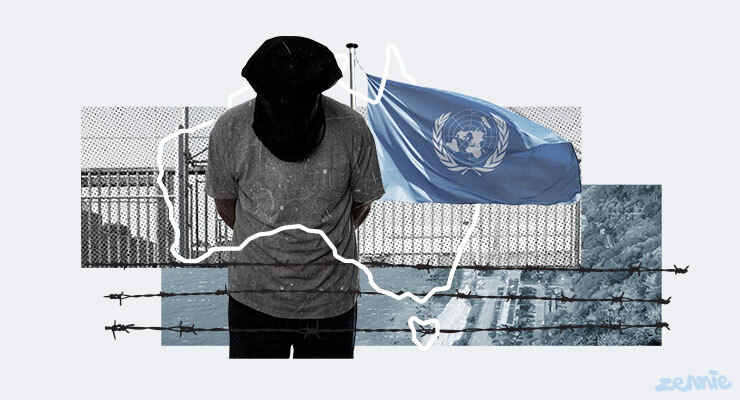
United Nations experts have questioned Australia’s “will” to comply with its international human rights obligations, as hopes of meeting an impending deadline hang by a thread.
Australian officials faced questioning from the UN Committee Against Torture at a hearing in Geneva last week, with scrutiny on rising rates of incarceration, the continued use of spit hoods, the disproportionate Indigenous incarceration rates, and the treatment of detainees in immigration detention centres.
The committee also zeroed in on Australia’s compliance with the Optional Protocol to the Convention Against Torture (OPCAT), which it ratified in 2017 and has just two months left to implement.
Under the protocol, signatory nations must allow a UN group to have unfettered access to places of detention, and must establish independent inspectors of places of detention, known as National Preventive Mechanisms (NPMs).
In Australia, these mechanisms are to be established by the states and territories.
After delaying its deadline to implement these measures several times, Australia now has until January 20 next year. It looks set to miss on both counts, after a UN visit last month was suspended after being “compromised” by a lack of cooperation, with the three largest states refusing to budge on launching NPMs until provided funding.
This argument was rejected during Australia’s appearance before the UN, with committee member Ilvija Pūce acknowledging the debate in Australia on whether the states or the federal government should pay for the NPMs.
“But looking at the situation from our perspective as outside observers and noticing the huge amount of financial resources that Australia puts into their prison systems, then we don’t think that financing of NPMs is really a financial problem,” Pūce said.
“It could be more of a problem of the will of particular responsible entities to deal with this problem, but we still hope very much that this issue will be solved and the NPMs will be established, and will be financially and operationally independent.”
Under the OPCAT, NPMs must be independent and properly resourced, something many of the existing Australian inspectors are not.
“We know cars don’t move without fuel, and fuel we can’t buy without money, and it’s an issue in many countries that the bodies are designated the task but the finances are not provided,” Pūce said.
Australia’s delegation head, Attorney-General’s Department deputy secretary Simon Newnham, said funding discussions are ongoing with the states, nearly five years after the agreement was ratified.
“They are currently calculating the cost of the gap of their existing frameworks and bodies and their requirements under OPCAT, and asking about the costs associated with bridging that gap. That work continues,” Newnham said.
Newnham confirmed that the implementation of the protocol and its impending deadline will be discussed at the upcoming meeting of Australian attorneys-general next month.
Australia’s implementation of the anti-torture convention was also questioned by the UN Committee. The federal government has confirmed Australia will first focus only on “primary” places of detention, such as prisons, and not include all places of detention, such as closed aged care facilities.
“Places of detention are all places people are deprived of their liberty,” Pūce said. “It should be up to the NPMs to decide which of those places request more detention, and in which moment.”
The appointed NPMs for the Commonwealth, ACT, Northern Territory, South Australia and Western Australia co-signed a letter on Monday urging the hold-out states to comply with the OPCAT.
“Where they have not yet done so, we call on all Australian governments to appoint NPMs, to legislate their role and powers, and to resource them to fully discharge their mandate to carry out preventive visits to places of detention to help prevent harm to children and young people,” the letter said.








Yet Australians, similar to the USA, repeatedly call out other Countries for their Human Rights Abuses.
Its not just people in “places of detention”. The way we treat marginalsed people in general is pretty appalling. Remember the robodebt thing, the aged cares facilities during covid, the rental crisis all over, the Centrelink gestapo slashing welfare payments whenever the recipient has a go and makes a few bucks of their own while our government doesn’t bother billionaires with taxation requests. Its all pretty sickening and screams pretty loudly that we dont care about anyone who isnt wealthy.
Torture is to elicit information from enemies. We don’t do that so we don’t need OPCAT or NPMs. What we actually partake of is bastardisation, performed against people we don’t like. Provides employment for sicko contractors. People we don’t like could be anyone, really. Reffos, biscuit stealers, people like that. You know. I mean, it’s an Aussie thing, always was. But what can you do? Let them all out? There wouldn’t be a safe biscuit in the country, oh no. Terrible loss of votes, we’d never get back in. Statistics clearly show that for every bashed kid we pick up 100 votes! Can’t go easy on crime! Or let the illegals in – they’re worth their weight in gold, vote-wise. Amazing what people will actually believe, isn’t it? But they do, that’s the thing. Believe anything. Remarkable. Sad, in a way. But there you are.
But torture? No, we don’t do any of that.
As far as I know, of course. Above my pay grade, thank God, anyway. OK? Bye.
Oh, you again? What? Bill of Rights? Don’t be silly. Goodbye!
“But torture? No, we don’t do any of that.”
True. If they’re aboriginal we just shoot them dead.
You don’t need torture chambers when you’ve got jobseeker.
Many thanks Denham for your timely contribution to a shameful situation that Australia only has itself to blame for, its disregard for the UN Declaration of Human Rights, of which we are a signatory.
Our shameful behavior, before recent scrutiny by the UN of our record in this area, needed exposure.
We also need to be mindful and vigilant about how we treat whistleblowers in this country. Treating them and trying them as criminals for speaking the truth to illegal or corrupt behavior. Recently Bernard Collaery (who has finally had his case dismissed), whilst David McBride and Richard Boyle are facing hefty sentences, are recent examples.
Then to top it all we have sat on our hands and allowed the UK and the US to illegally silence and torture one of our citizens in the UK, Julian Assange.
I recommend the following book “The Trial of Julian Assange” by Nils Melzer – UN Special Rapporteur on Torture.
https://www.booktopia.com.au/the-trial-of-julian-assange-nils-melzer/book/9781839766220.html?gclid=Cj0KCQiAg_KbBhDLARIsANx7wAwvkAuAo4XiK63di1F9QFE9gJtAkVoVtWUtRb1d5et-FR_D53gRXTkaAkTrEALw_wcB
Well said, thanks for the link.
From another of Denham’s reports:
“US prison provider is paid $900k a day to take over Nauru offshore processing.”
That, and the billions we pay for the running of our onshore prison services, must be why the government can’t find any money to make sure that things are done above board.